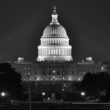Al-Haramain v. Obama?—The Al-Haramain warrentless wiretap case is one of the most important constitutional controversies awaiting resolution by the federal courts—if the Obama administration doesn’t obstruct its resolution. The facts are straightforward. In 2004 the Treasury Department’s Office of Foreign Assets Control (OFAC) declared Al-Haramain, an Oregon-based Islamic charity, a “specially designated global terrorist.” While Al-Haramain’s attorneys worked to get the organization “de-listed,” OFAC mailed the lawyers a file of documents that included evidence of wiretapped conversations between Al-Haramain’s Washington, D.C., attorneys and Al-Haramain associates living outside the country. Unaware that the file included secret material, the attorneys photocopied it and sent it to their clients, including to the Al-Haramain associates living abroad. Months later, OFAC dispatched FBI agents to retrieve all copies of the files circulating in the U.S. When the New York Times revealed the Justice Department’s warrantless wiretap program, one of Al-Haramain’s attorneys realized what the FBI had retrieved. He obtained a copy of the documents (presumably from one of the clients living abroad) and filed suit, presenting them to a federal judge in Portland. That material, now locked in a Sensitive Compartmented Security Facility, is the only known evidence of the Bush administration’s illegal wiretapping program. It is also essential evidence in Al-Haramain’s effort to contest its designation as a terrorist organization.
What began as a Fourth Amendment case regarding illegal search and seizure has become a controversy that pertains to the most important powers defined in our Constitution: the division of powers among co-equal branches of government. In 2006, Justice Department attorneys in Washington, D.C., told Oregon federal District Judge Garr King that they were sending agents to his chambers to retrieve the classified documents. Judge King refused. The FBI backed down.
The case was transferred to San Francisco, where District Judge Vaughn Walker’s order—to allow two Al-Haramain lawyers to obtain security clearances and review the secret documents in his chamber—was appealed by the DOJ. In the last week of February, the Ninth Circuit denied the appeal.
The Obama Justice Department responded with a motion that walks over Judge Walker’s order, claiming “plaintiff’s counsel are not entitled access to the classified material in question.” The DOJ also warned Judge Walker to provide notice if he intends to allow the attorneys to see the documents, and further warned that if he does, the DOJ will “withdraw that information from submission to the Court and use in this case.”
“That’s just astounding!” said Al-Haramain attorney Jon Eisenberg in an e-mail. “It’s a not-so-thinly-veiled threat to send Executive Branch authorities (the FBI? The Army?) to Judge Walker’s chambers to seize the classified material from his files.” In short, a constitutional crisis in a San Francisco courtroom, where the Obama administration is refusing to obey the orders of a federal judge whose ruling might lead to the transgressions of the Bush administration.
Economic Dunkirk—Add University of Texas at Austin professor James K. Galbraith to the list of economists who have concluded that the current economic crisis is unlike anything we have seen in our lifetimes. In written testimony submitted to the House Financial Services Committee, Galbraith quoted British economist John Maynard Keynes: “The world has been slow to realize that we are living this year in the shadow of one of the greatest economic catastrophes of modern history.” Galbraith contends that measures being taken to address the current crisis aren’t adequate. The March 1 issue of the Spectator described a deal the government made to assume $301 billion in bad assets from Citigroup.
It’s not likely that Galbraith would buy what Citi sold to the Treasury. He told the Financial Services Committee: “The sub-prime securities that are at the bottom of this problem were, and are, in very large measure, corrupt, abusive and even fraudulent from the very beginning. They should never have been issued, and they should never have been securitized…. No private buyer, with responsibility to do due diligence on these loans, will ever purchase them….” Galbraith would place the deeply troubled big banks in receivership, insure their deposits, replace their management, and do a clean audit to isolate their bad assets. An evident Anglophile, Galbraith quoted Winston Churchill addressing Parliament on the eve of the evacuation of Dunkirk during World War II. We should be preparing ourselves “for hard times and heavy tidings.”






0 Comments